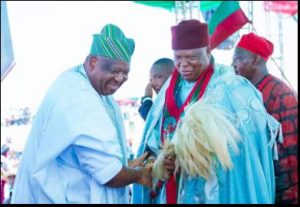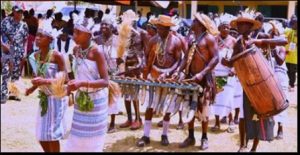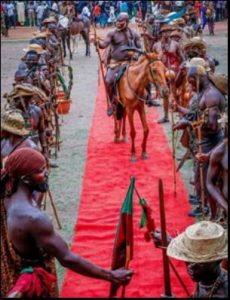EVENT AND PEOPLE
Nzem Berom: More than a cultural fiesta
Published
1 month agoon

By ERIC PAM
Nzem Berom is a unifying cultural festival of the Berom people of Plateau State, Nigeria, involving all the 14 districts normally celebrated in the capital, Jos. The first edition was held in 1981 at the Jos Polo Field but has since been shifted to the Rwang Pam Township Stadium.


Organized yearly towards the end of April or beginning of May under the aegis of the Berom Educational and Cultural Organization, BECO, in conjunction with the Gbong Gwom, traditional rulers and other Berom bodies like the Berom Women Association and the Berom Youth Moulders, the festival has brought several achievements to the Berom people in many ways.

The 2024 Nzem Berom was unique in two major ways. First, it served as the platform for a N10b appeal fund for the Wurom Lagacy Trust Foundation towards the establishment of the Wurom Technological Village, Agricultural Extension Hub, Wurom Cultural Museum, Library and Sites and Educational Endowment. Second, it marked the 15th anniversary of the Berom nation’s paramount ruler, the Gbong Gwom Jos, Da Jacob Gyang Buba, on the exalted throne.
Activities to kick start this year’s Nzem Berom, which had as theme, “Reconstruction, Rehabilitation and Reorientation,” started on May 9 with a surgical screening at the Vom Christian Hospital. On May 10, Muslim prayers were held in Jos, Bukuru and Aboro (in Kaduna State) as part of the activities to herald the cultural fiesta.
A lot of people may not understand the place of Aboro in the Berom nation’s scheme of things. Two groups of Berom had migrated to Kaduna at different times and settled there. They settled in Aboro and Sabon Zawan. The former, also called Berom Badu, most of whom hailed from Bachi and Shonong, left in the pre-colonial period, that is, before the Jihad (following waves of migration into Riyom) in order to look for land for settlement, farming and grazing.
The latter could be traced to efforts of the colonial government to resettle the Berom in Jema’a Province in order to conveniently explore tin on their land. But the Berom fore-fathers vehemently resisted the move. This settlement, which included some Berom, was initially called Sabon Zawan and shares boundary with Aboro but is now known as Sabon Gida. It should be noted that about ninety percent of the people of Aboro became Muslims during the reign of the Sardauna of Sokoto.
There was also a medical out-reach at the Vom Christian Hospital on May 10 and 11. Also on May 11, there was hiking and a tree planting event at the Fwil, Vwang District. May 13, was the day for a solemn assembly at the Ten Commandments, Dwei, Du, Jos South LGA. Attention was shifted to the National Institute for Policy and Strategic Studies, NIPSS, Kuru, where a colloquim was held on May 14 on theme, “The Societies, Histories and Narratives of the Berom Peoples and their Land.” It is worthy of note that all the 4 Berom local government areas – Riyom, Barkin Ladi, Jos North and Jos South – had held their respective Nzem Berom preparatory to the grand festival held on Friday May 17 at the Rwang Pam Township Stadium.
The early hours of Friday, May 17, 2024, witnessed showers of rain in Heipang, Foron, Vwang and parts of Jos and environs. Since the essence of the Nzem Berom is to usher in rainfall preparatory to the planting season, the rain was considered as a sign that God was with the Berom people; it was seen as a blessing. Many people had, however, prayed God to allow the hours designated for the festival to be rain-free. And God acquiesced.
Jos was, indeed, ignited by the proud Berom people. And the city came to life in a very colourful and boisterous way. Beautifully clad in the Berom traditional colours of ox-blood and green, their destination was the Rwang Pam Township Stadium, venue of the mother of all cultural festivals.
The stadium itself was also dressed in the traditional colours. Ox-blood symbolizes tyi which is a red substance derived from an underground stone. Berom warriors, in times of attacks or defence, used to smear their faces with tyi before swinging into action. Tyi is also believed to cure some ailments. The green colour is linked to military/ defence as in the past, yep (cactus) was used as a fence for almost all communities.
It was believed that arrows and bullets could not easily penetrate them, hence provided heavy security for the Berom people. It should be noted that the idea of representing the Berom identity with these colours was conceived in 2004 by late Da Victor Pam, former Gbong Gwom Jos.
The arrival of the Gbong Gwom’s motorcade accompanied by besuga (warriors) called the event to order. The presence of the paramount ruler gave authority to the ceremony and at about 10:50am, the opening prayer was administered to formally declare the event open. A prominent Berom artiste, Vincent Nyam, popular known as Jah Device, thrilled the gathering and proved to the world why he is internationally renowned. Then the traditional homage followed with each local government taking its turn after which youth took their turn. Then the 2024 Nzem Berom pageant (Zere Berom) along with the beauty pageants of the various districts also filed out to pay homage to the paramount ruler, led by the BYM President, Barr. Solomon Nwantyi.
The sudden arrival of the motorcade of Governor Caleb Mutfwang brought everything to a standstill. It was as if it was at that point that the festival fully commenced. As he alighted from his car, the thunderous applause and shouts of joy that filled up the venue could only be imagined. Whether it was planned or instinctive, the deejay apparently succeeded in adding ecstasy to the already charged atmosphere by playing the Caleb Mutfwang political campaign jingle – Gida Gida (a beautiful Hausa rendition of Ezra Jinang).
Incidentally, Barr. Caleb Mutfwang attended the 2023 Nzem Berom as governor-elect but also elicited the same kind of thunderous applause.
An important point of the event was homage paying through dance parade (match past) by different groups – Mandyeng (Kuru), Mandyeng (Za’ang), Vwana (Gyel), Bachi Hunters, Ude (Ju Foron), Aboro Dancers, Gashish Dancers, Jishe Cultural Dancers, Gwol Dance Group, Bakin Kogi Dance Group, Igbo Community, Mwaghavul dance Group, Makama Hunters, among others. There was also the paying of homage by title holders in Berom land, led by former Governor Jonah Jang (Madakin Jos).
In his remark, the Chief Host, Gbong Gwom Jos, Da Gyang Buba, appreciated all the invited guests for honouring the invitation and declared: “A people without a culture, without traditions are a lost people. We have deliberately continued to host this cultural festival to remind our detractors and people who think they can intimidate us and the people of Plateau State by their dastardly act of killings and their desire to take over our lands, by the grace of God Almighty, we shall not be vanquished.”
On his part, Governor Mutfwang underscored the need for ethnic unity, which, he said, fosters unity generally, adding that plans were underway for his administration to kick-start a Cultural Day. He was emphatic about the resettlement of internal displaced persons, pointing out that adequate security would be provided in the hinterlands for that purpose.
In their separate remarks, President of the Senate, Senator Godswill Akpabio, represented by Senator Diket Plang, and the Gombe State Deputy Governor, Dr. Manasseh Daniel Jatau, commended the Berom nation for preserving their rich cultural heritage and congratulated the paramount ruler for clocking 15 years on the throne.
From the mouth of former Governor Jonah Jang were words of admonition for the Berom people to make God their priority in everything they do. Among other speakers at the event were the chief launcher, General Theophilus Danjuma, and Secretary to the Government of the Federation, Chief George Akume, who was represented by Mr. Jack Yakubu Pam.
Chairman of the 2024 Nzem Berom Main Planning Committee, Senator Simon Mwadkwon, stated that the Wurom Legacy Trust Foundation would better the lives of the people and greatly impact the Berom nation. The event was graced by dignitaries of Berom extraction and personalities from different nationalities from within and outside Plateau State, especially highly placed political office holders and traditional rulers.
One remarkable impact of the event that will linger in the minds of many people was the recognition given to the office of the BECO President. It is believed that it was the first time a BECO President was so recognized with a seat next to the number one citizen of the state – Governor Mutfwang.
The event climaxed with donations of varying amounts of money by illustrious sons and daughters, groups as well as invited guests towards the Wurom Legacy Trust Foundation.
Nzem Berom has gone beyond the traditional display of dances, music and drama to one of creativity and innovation, showcasing the Berom ideology and philosophy. These define their identity and interests and the processes that drive their growth and development.
This is a pointer to the fact that the world is dynamic and efforts are geared towards changes that bring socio-political and economic development to the society. Interestingly, the festival is also celebrated outside Jos where large groups of Berom people reside like Abuja, Lagos and the United Kingdom.
Pam is a Principal Lecturer in the Department of General Studies, Plateau State Polytechnic, Barakin Ladi








